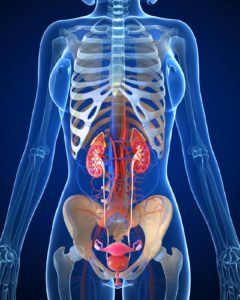What are the kidneys and what do they do?
The kidneys are a pair of bean-shaped organs located near the middle of the back, one on either side of the backbone, level with the lower ribs. An adult kidney is about the size of a fist.
The kidneys filter and clean blood by removing waste products and toxins, which are eliminated from the body in urine. Urine is produced in tiny blood filters called nephrons in the kidney; there are about 1.2 million nephrons within each kidney. The urine is then carried through a tube called the ureter into the bladder, where it is stored until it is ready to be passed out of the body through another tube, called the urethra, during urination.
The main waste products in urine are: urea (from protein metabolism), creatinine (from muscle), uric acid (from metabolism of nucleic acid), and the broken down products of hormones. Some of these waste products are measured to test kidney function.
The kidneys also balance body fluids, regulate blood pressure, and produce hormones that aid in other important body functions, such as absorption of calcium in the gut and manufacture of red blood cells by the bone marrow.
A person can live a perfectly healthy life with one kidney, and if a kidney is removed as a result of cancer or for transplantation, there will not be any significant loss of kidney function in the remaining kidney.
References:
Cancer Research UK: What is kidney cancer?
Kidney Research UK: About kidneys and kidney disease
Kidney Research UK: Kidney health information
Further reading: Action Kidney Cancer Essential guide: The kidneys
Updated: October 2023 Next review: October 2025



